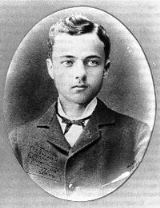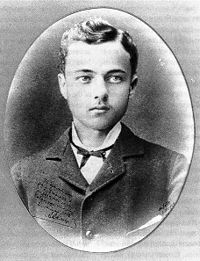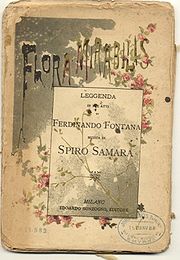
Spyridon Samaras
Encyclopedia
Spyridon-Filiskos Samaras (also Spyros / Spiro Samara; Σπυρίδων Σαμάρας) (17 November/29 November 1861 Corfu
– 25 March/7 April 1917 Athens
) was a Greek
composer
particularly admired for his operas who was part of the generation of composers that heralded the works of Giacomo Puccini
. His compositions were praised worldwide during his lifetime and he is arguably the most internationally lauded Greek composer before Dimitri Mitropoulos.
 As a young man Samaras studied with Spyridon Xyndas
As a young man Samaras studied with Spyridon Xyndas
(Σπυρίδων Ξύνδας) in Corfu. From 1875-1882 he studied at the Athens Conservatory with Federico Bolognini, and Enrico Stancampiano. His first opera
Torpillae (now lost) premiered in Athens in 1879. He went to Paris in 1882 to study at the Paris Conservatoire and became a favorite of Jules Massenet
. His other instructors included Léo Delibes
, Théodore Dubois
, and Charles Gounod
. He worked successfully as a composer in Paris for three years and then migrated to Italy in 1885.
Samaras quickly became an important figure in the opera scene in Italy. His opera Flora mirabilis première in Milan in 1886 and in 1888 Medgé was successfully staged at the Teatro Costanzi in Rome with French opera star Emma Calvé
in the title role. Samaras became closely associated with Edoardo Sonzogno, a Milanese publisher. Sonzogno founded the Teatro Lirico Internazionale and chose Samaras' La martire for the theater's opening on 22 September 1894. The opera had premiered previously that year in Naples and is based on a libretto
by Luigi Illica
with many naturalistic elements, which gave space to Samaras musical personality for an equal treatment.
Samaras' works enjoyed wide distribution with operas staged in Paris, Monte Carlo, Cologne, Berlin, Vienna, Malta, Bucharest, Constantinople, Smyrna, Alexandria, Cairo, and of course Greece and Italy . He wrote a total of fifteen stage works, of which the last three were all based on texts by Paul Milliet
; Storia d'amore or La biondinetta (1903), Mademoiselle de Belle-Isle (1905) and Rhea (1908). He returned to Greece in 1911 under the conception that he would be appointed the director of the Athens Conservatoire
. Nevertheless, Samaras was not given a post at the Athens Conservatory partly due to the 'National School' controversy. He therefore supported himself by composing operettas intended at satisfying a variety of audiences rather than continuing in his usual creative vain. His last opera Tigra, although started during this time and containing some of his best work, was never finished.
Samaras is also known for composing the Olympic Anthem, the words of which were contributed by Kostis Palamas
. The Anthem was first performed during the opening ceremony of the 1896 Summer Olympics
, the first modern Olympic Games
. It was declared the official anthem of the Olympic movement by the International Olympic Committee
in 1958 and has been used at every Olympic opening ceremony since the 1960 Winter Olympics
.

Corfu
Corfu is a Greek island in the Ionian Sea. It is the second largest of the Ionian Islands, and, including its small satellite islands, forms the edge of the northwestern frontier of Greece. The island is part of the Corfu regional unit, and is administered as a single municipality. The...
– 25 March/7 April 1917 Athens
Athens
Athens , is the capital and largest city of Greece. Athens dominates the Attica region and is one of the world's oldest cities, as its recorded history spans around 3,400 years. Classical Athens was a powerful city-state...
) was a Greek
Greece
Greece , officially the Hellenic Republic , and historically Hellas or the Republic of Greece in English, is a country in southeastern Europe....
composer
Composer
A composer is a person who creates music, either by musical notation or oral tradition, for interpretation and performance, or through direct manipulation of sonic material through electronic media...
particularly admired for his operas who was part of the generation of composers that heralded the works of Giacomo Puccini
Giacomo Puccini
Giacomo Antonio Domenico Michele Secondo Maria Puccini was an Italian composer whose operas, including La bohème, Tosca, Madama Butterfly, and Turandot, are among the most frequently performed in the standard repertoire...
. His compositions were praised worldwide during his lifetime and he is arguably the most internationally lauded Greek composer before Dimitri Mitropoulos.
Biography

Spyridon Xyndas
Spyridon Xyndas or Spiridione Xinda was a Greek composer and guitarist, whose last name has also been transliterated as "Xinta", "Xinda", "Xindas" and "Xyntas".-Biography:...
(Σπυρίδων Ξύνδας) in Corfu. From 1875-1882 he studied at the Athens Conservatory with Federico Bolognini, and Enrico Stancampiano. His first opera
Opera
Opera is an art form in which singers and musicians perform a dramatic work combining text and musical score, usually in a theatrical setting. Opera incorporates many of the elements of spoken theatre, such as acting, scenery, and costumes and sometimes includes dance...
Torpillae (now lost) premiered in Athens in 1879. He went to Paris in 1882 to study at the Paris Conservatoire and became a favorite of Jules Massenet
Jules Massenet
Jules Émile Frédéric Massenet was a French composer best known for his operas. His compositions were very popular in the late 19th and early 20th centuries, and he ranks as one of the greatest melodists of his era. Soon after his death, Massenet's style went out of fashion, and many of his operas...
. His other instructors included Léo Delibes
Léo Delibes
Clément Philibert Léo Delibes was a French composer of ballets, operas, and other works for the stage...
, Théodore Dubois
Théodore Dubois
François-Clément Théodore Dubois was a French composer, organist and music teacher.-Biography:Théodore Dubois was born in Rosnay in Marne. He studied first under Louis Fanart and later at the Paris Conservatoire under Ambroise Thomas. He won the Prix de Rome in 1861...
, and Charles Gounod
Charles Gounod
Charles-François Gounod was a French composer, known for his Ave Maria as well as his operas Faust and Roméo et Juliette.-Biography:...
. He worked successfully as a composer in Paris for three years and then migrated to Italy in 1885.
Samaras quickly became an important figure in the opera scene in Italy. His opera Flora mirabilis première in Milan in 1886 and in 1888 Medgé was successfully staged at the Teatro Costanzi in Rome with French opera star Emma Calvé
Emma Calvé
Emma Calvé, born Rosa Emma Calvet , was a French operatic soprano.Calvé was probably the most famous French female opera singer of the Belle Époque. Hers was an international career, and she sang regularly and to considerable acclaim at the Metropolitan Opera House, New York, and the Royal Opera...
in the title role. Samaras became closely associated with Edoardo Sonzogno, a Milanese publisher. Sonzogno founded the Teatro Lirico Internazionale and chose Samaras' La martire for the theater's opening on 22 September 1894. The opera had premiered previously that year in Naples and is based on a libretto
Libretto
A libretto is the text used in an extended musical work such as an opera, operetta, masque, oratorio, cantata, or musical. The term "libretto" is also sometimes used to refer to the text of major liturgical works, such as mass, requiem, and sacred cantata, or even the story line of a...
by Luigi Illica
Luigi Illica
Luigi Illica was an Italian librettist who wrote for Giacomo Puccini , Alfredo Catalani, Umberto Giordano, Baron Alberto Franchetti and other important Italian composers. His most famous opera librettos are those for La bohème, Tosca, Madama Butterfly and Andrea Chénier.Illica was born at...
with many naturalistic elements, which gave space to Samaras musical personality for an equal treatment.
Samaras' works enjoyed wide distribution with operas staged in Paris, Monte Carlo, Cologne, Berlin, Vienna, Malta, Bucharest, Constantinople, Smyrna, Alexandria, Cairo, and of course Greece and Italy . He wrote a total of fifteen stage works, of which the last three were all based on texts by Paul Milliet
Paul Milliet
Paul Milliet was a French dramatist and librettist of the Parisian Belle Époque. His opera librettos include Jules Massenet's Hérodiade and Werther , Alfred Bruneau's Kérim , Spyridon Samaras's La biondinetta , Mademoiselle de Belle Isle and Rhea and Camille...
; Storia d'amore or La biondinetta (1903), Mademoiselle de Belle-Isle (1905) and Rhea (1908). He returned to Greece in 1911 under the conception that he would be appointed the director of the Athens Conservatoire
Athens Conservatoire
The Athens Conservatoire is the oldest conservatoire in modern Greece. It was founded in 1871 by the Athens Music and Drama Society. Initially, the musical instruments that were taught there were limited to the violin and the flute, representative of the ancient Greek Apollonian and Dionysian...
. Nevertheless, Samaras was not given a post at the Athens Conservatory partly due to the 'National School' controversy. He therefore supported himself by composing operettas intended at satisfying a variety of audiences rather than continuing in his usual creative vain. His last opera Tigra, although started during this time and containing some of his best work, was never finished.
Samaras is also known for composing the Olympic Anthem, the words of which were contributed by Kostis Palamas
Kostis Palamas
Kostis Palamas was a Greek poet who wrote the words to the Olympic Hymn. He was a central figure of the Greek literary generation of the 1880s and one of the cofounders of the so-called New Athenian School along with Georgios Drosinis, Nikos Kampas, Ioanis Polemis.-Biography:Born in Patras, he...
. The Anthem was first performed during the opening ceremony of the 1896 Summer Olympics
1896 Summer Olympics
The 1896 Summer Olympics, officially known as the Games of the I Olympiad, was a multi-sport event celebrated in Athens, Greece, from April 6 to April 15, 1896. It was the first international Olympic Games held in the Modern era...
, the first modern Olympic Games
Olympic Games
The Olympic Games is a major international event featuring summer and winter sports, in which thousands of athletes participate in a variety of competitions. The Olympic Games have come to be regarded as the world’s foremost sports competition where more than 200 nations participate...
. It was declared the official anthem of the Olympic movement by the International Olympic Committee
International Olympic Committee
The International Olympic Committee is an international corporation based in Lausanne, Switzerland, created by Pierre de Coubertin on 23 June 1894 with Demetrios Vikelas as its first president...
in 1958 and has been used at every Olympic opening ceremony since the 1960 Winter Olympics
1960 Winter Olympics
The 1960 Winter Olympics, officially known as the VIII Olympic Winter Games, were a winter multi-sport event held between February 18 and 28, 1960 in Squaw Valley, California, United States. In 1955 at the 50th IOC meeting, the organizing committee made the surprise choice to award Squaw Valley as...
.
Complete stage works

- Torpillae, incidental music for a play, words by Gavziilidis and K. Triandafyllos, Athens, 1879.
- Olas, opera in 4 Acts, libretto by Fravassili, now lost, 1882.
- Flora mirabilis, opera in 3 Acts, libretto by Ferdinando Fontana, Teatro alla Scala, Milan, 1886.
- Medge, opera in 4 Acts, libretto by Ferdinando Fontana, Teatro Constanzi, Rome, 1888.
- Messidor, opera after Alexandre Dumas' novel Le Chevalier de Maison-RougeLe Chevalier de Maison-RougeLe Chevalier de Maison-Rouge was written in 1845 by Alexandre Dumas, père as part of a series referred to as the Marie Antoinette romances...
, written before 1891, now lost. - Lionella, opera in 3 Acts, libretto by Fontana, lost except for Hungarian Rhapsody, orch, Teatro alla Scala, Milan, 4 April 1891.
- La martire, opera in 3 Acts, libretto by Luigi IllicaLuigi IllicaLuigi Illica was an Italian librettist who wrote for Giacomo Puccini , Alfredo Catalani, Umberto Giordano, Baron Alberto Franchetti and other important Italian composers. His most famous opera librettos are those for La bohème, Tosca, Madama Butterfly and Andrea Chénier.Illica was born at...
, Teatro Lirico Internazionale, Milan, 1894. - La furia domata, opera in 3 Acts, libretto by E. A. Butti and G. Macchi after Shakespeare's The Taming of the ShrewThe Taming of the ShrewThe Taming of the Shrew is a comedy by William Shakespeare, believed to have been written between 1590 and 1591.The play begins with a framing device, often referred to as the Induction, in which a mischievous nobleman tricks a drunken tinker named Sly into believing he is actually a nobleman himself...
, Teatro Lirico Internazionale, Milan, 1895. - Storia d’amore o La biondinetta, opera in 3 Acts, libretto by Paul MillietPaul MillietPaul Milliet was a French dramatist and librettist of the Parisian Belle Époque. His opera librettos include Jules Massenet's Hérodiade and Werther , Alfred Bruneau's Kérim , Spyridon Samaras's La biondinetta , Mademoiselle de Belle Isle and Rhea and Camille...
, Teatro Lirico Internazionale, Milan, 1903. - Mademoiselle de Belle-Isle, opera in 4 Acts, libretto by Paul Milliet, Teatro Politeama, Genoa, 1905.
- Rhea, opera in 3 Acts, libretto by Paul Milliet, Teatro Verdi, Florence, 1908.
- Tigra, opera in 3 Acts unfinished, libretto R. Simoni, 1911, only Act 1 exists.
- Pólemos en polémo, operetta in 3 Acts, libretto by G. Tsokopoulos and I. Delikaterinis, Athens, 10 April 1914.
- I pringípissa tis Sassónos, operetta in 3 Acts, libretto by N.I. Laskaris and P. Dimitrakopoulos, Athens, 21 Jan 1915.
- I Kritikopoúla, operetta in 3 Acts, libretto by Laskaris and Dimitrakopoulos, Athens, 30 March 1916.
Selected piano music
- Scènes Orientales, Quatre Suites caractéristiques, 1882 Paris
- Bohémienne, 1888
Sources
- George Leotsakos. The New Grove Dictionary of OperaNew Grove Dictionary of OperaThe New Grove Dictionary of Opera is an encyclopedia of opera, considered to be one of the best general reference sources on the subject. It is the largest work on opera in English, and in its printed form, amounts to 5,448 pages in four volumes....
, edited by Stanley Sadie (1992), ISBN 0-333-73432-7 and ISBN 1-56159-228-5
External links
- The Music Museum of the Philharmonic Society of CorfuPhilharmonic Society of CorfuThe Philharmonic Society of Corfu is today widely known as a community band in Corfu, Greece. However, when it was founded in 1840, its initial scope was to become the first Greek music academy organised on European prototypes...

